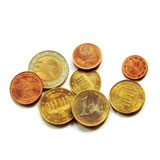Money and Finances
You are permitted to take in any amount of money into Germany. But you should check the country of origin to see if restrictions apply there.

The Euro was introduced as the official currency in Germany and most other European Union States on January 1st, 2002. One Euro is made up of 100 cents.
Banks
There are numerous banks and savings banks ("Sparkassen") in Germany. Banks are private institutions. "Sparkassen" fall under the jurisdiction of local authorities. This is why they have names such as "Stadtsparkasse Köln", "Hamburger Sparkasse"; "Sparkasse Dresden", etc. Banks and "Sparkassen" offer different services at different prices and conditions. This means account charges and money transfer charges often vary. Consumer advice agencies provide information on banks and "Sparkassen" (see chapter ![]() Organisations and Contacts).
Organisations and Contacts).
Bank Accounts
The most common form of account in Germany, whether at a bank or Sparkasse, is a "giro account", also called a checking account or current account. Most banks demand to see a residence permit before an account can be opened. Most financial transactions are done using this type of account. Employers transfer wages to these accounts, for instance. Payments for rent, electricity, etc. are also made using these accounts.

The term used to define the transfer of money from one account to another is called "Überweisung". A special form called an "Überweisungformular" is filled out for this purpose. Transfer costs are usually lower, or non-existent, at banks and Sparkassen where the account is held.
If you want to place a regular automatic transfer of money (for instance apartment rent, electricity bills, etc) the bank or Sparkasse can pay these bills at a set date automatically. This is called a "Dauerauftrag". This continues automatically until the amount is changed or the standing order terminated.
The direct debit authorisation ("Einzugsermächtigung" or "Lastschrift" / "Lastschriftverfahren") allows certain companies to deduct varying sums of money directly from your account and is a practical way of paying invoices such as telephone bills. The company is given a written direct debit authorisation ("Einzugsermächtigung"). Then the bills (for instance telephone bills) are deducted automatically from your account. You normally do not have to worry about misuse from legitimate companies as money deducted falsely from your account can be demanded back within a few weeks of the mistake occurring and the direct debit authorisation can be stopped at any time. It is, however, prudent to check your bank account statements and your bills.
EC Cards and Cash Machines

After opening a bank account, customers can receive an EC card ("EC-Karte") with a corresponding secret number called a "Geheimnummer" (Pin). Cash can be withdrawn by using this EC card and the number at cash machines ("Geldautomaten") in Germany and across Europe. If money is withdrawn at a machine that is not part of the bank or Sparkasse, a fee is normally levied. Many shops and petrol stations also allow you to pay for goods and services using the EC card in conjunction with the pin number or signature (see chapter ![]() Shopping). You can also print bank account statements ("Kontoauszüge") at machines in branches of your bank using the EC card. All transactions are listed on these statements. Money transferred to the account (credits) are indicated with an "H" ("Haben"). Money transferred from the account (debits) are indicated with an "S" ("Soll").
Shopping). You can also print bank account statements ("Kontoauszüge") at machines in branches of your bank using the EC card. All transactions are listed on these statements. Money transferred to the account (credits) are indicated with an "H" ("Haben"). Money transferred from the account (debits) are indicated with an "S" ("Soll").
Credit Cards

There are a number of companies that issue credit cards in Germany. Your bank, Sparkasse or a consumer advice centre can advise you as to which credit card is best suited to you. Most credit card companies charge a yearly fee for the usage of the credit card.
Bank Overdrafts
Most banks offer an automatic credit limit called the "Überziehungskredit", which is an additional amount of money that can be drawn from a current account when it is in debit. It is also referred to as "Dispositonskredit" or "Dispo" for short, and is normally related to your monthly income and the amount of savings you have. It enables you to temporarily increase cash flow by allowing you to spend more than you have in your current account (called "das Konto überziehen" in German). However, you have to pay back not just the amount overdrawn but interest on this amount.
Homebanking
Many financial institutions also offer their customers the possibility of conducting financial transactions from the comfort of their own home via computers. Staff at your local branch can advise you about this service.
Opening a Bank Account
Before you open a bank account, the following needs to be clarified:
- How high are the bank charges?
- Will you get an overdraft facility and what are the current interest rates?
- Where can you withdraw money free of charge (how many of these machines are located in your area)?
- Will you receive an EC card immediately?
- Can you withdraw money from cash machines as soon as the account is opened?
- How long will it take before standing orders ("Daueraufträge") and direct debit authorisation ("Einzugsermächtigungen", "Lastschriftverfahren") can be processed?
- When can you apply for a credit card and how long will it take to process?
